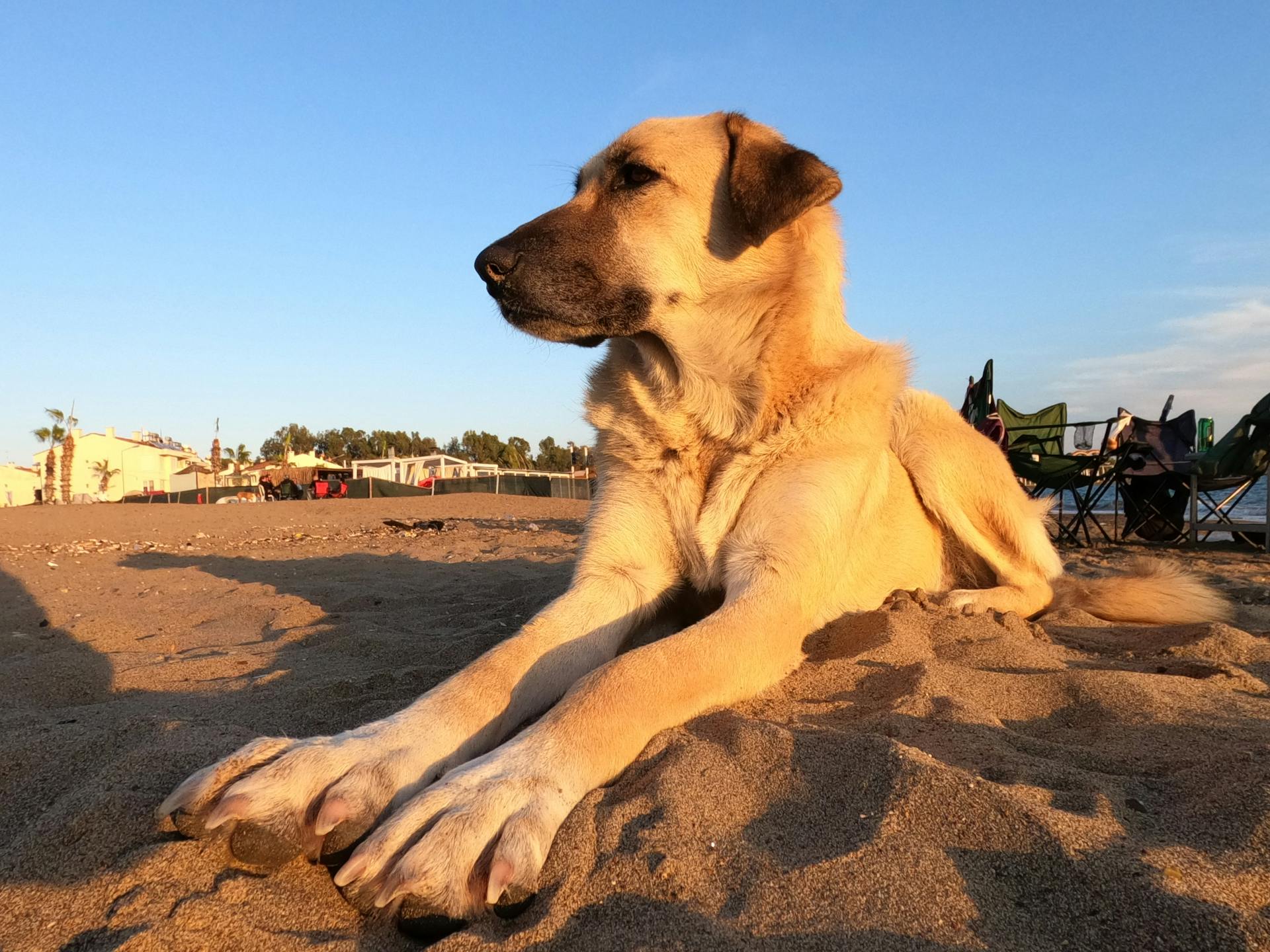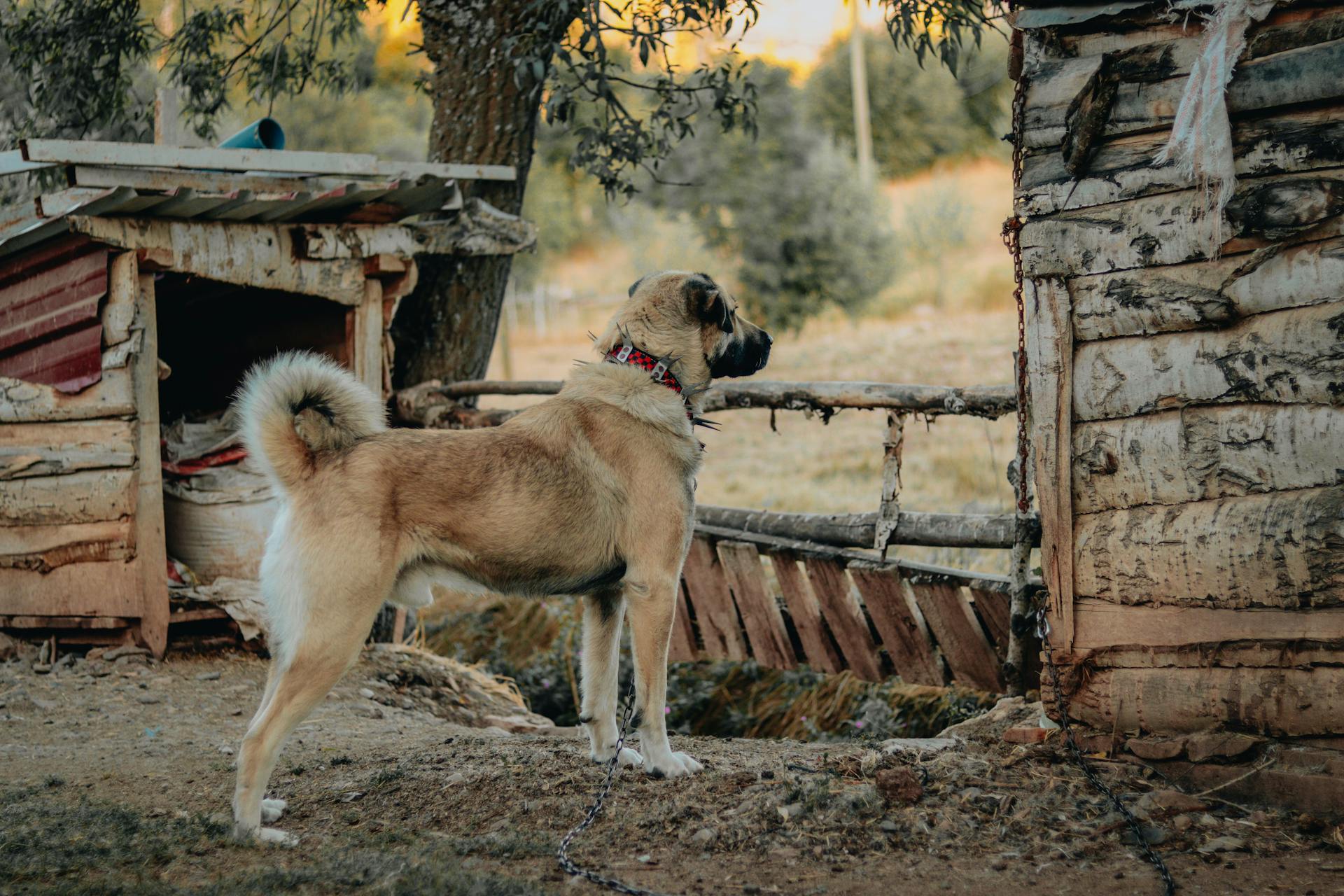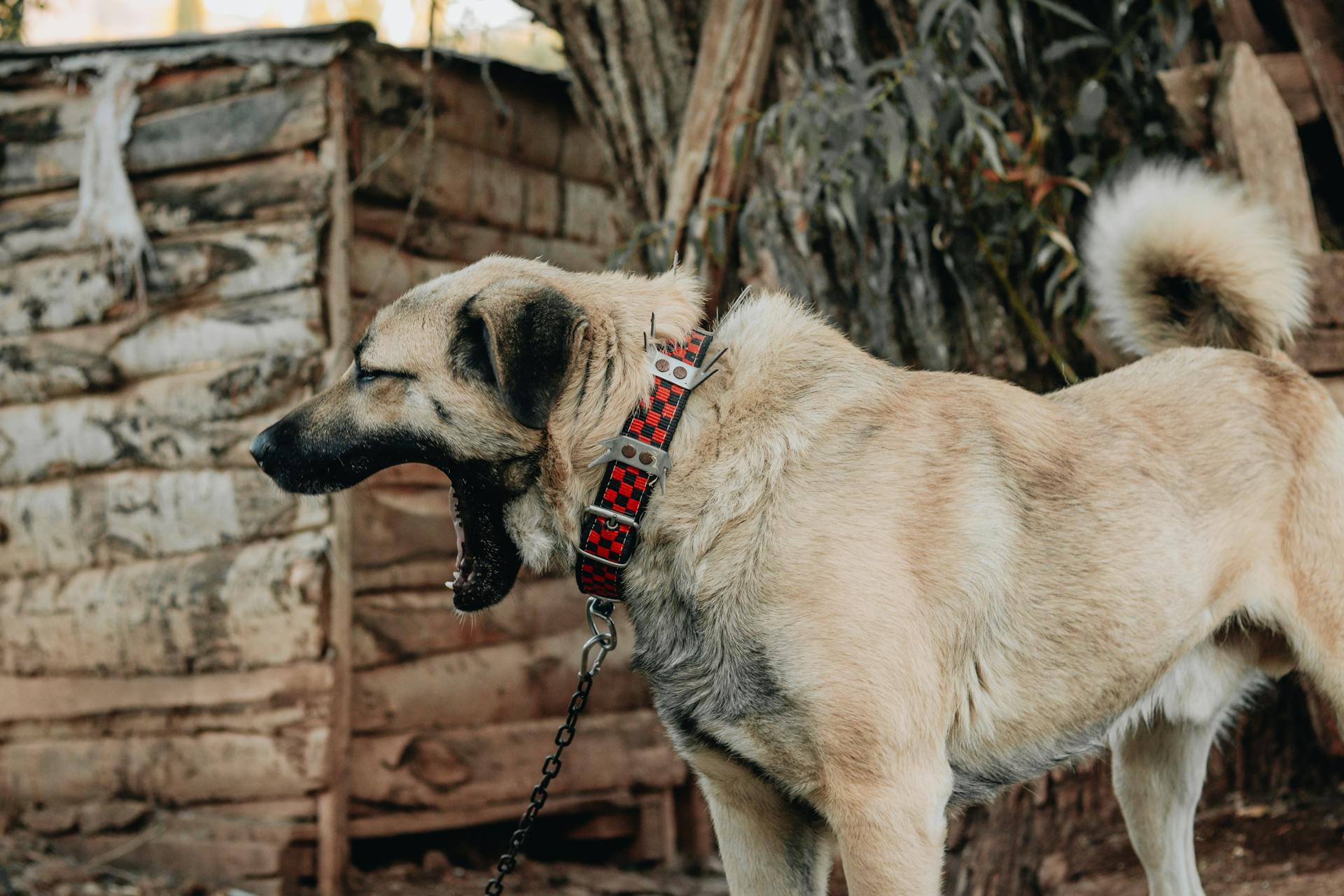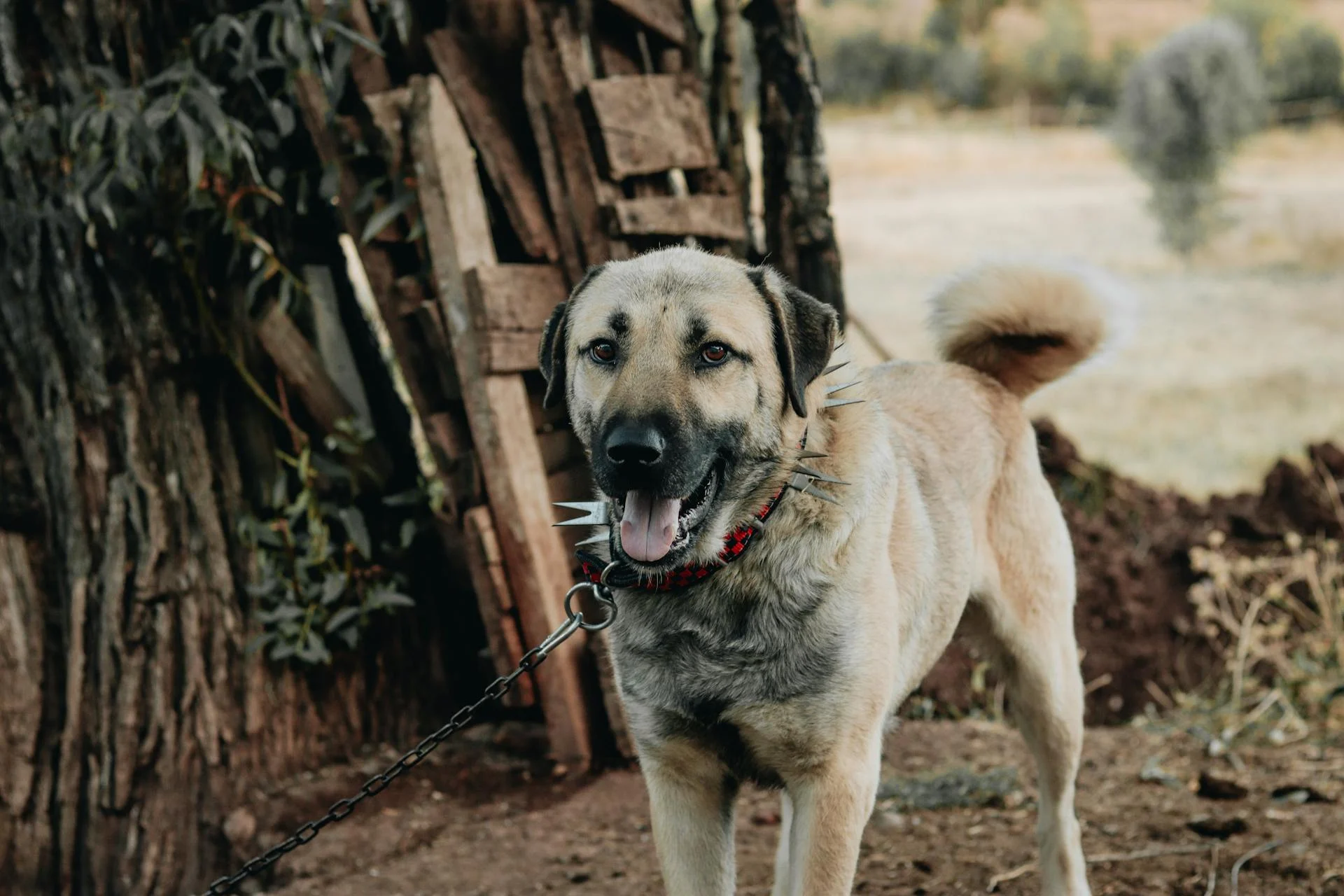
Welcoming a new Kangal Shepherd puppy into your family can be a thrilling experience, but it's essential to be prepared for the challenges that come with raising one of these magnificent creatures.
Kangal Shepherd puppies are born after a gestation period of approximately 62-68 days, and they typically weigh between 1-3 pounds at birth.
As a new owner, it's crucial to understand that Kangal Shepherd puppies require early socialization to become confident and well-adjusted adult dogs.
Their eyes open around 10-14 days after birth, and they start to walk around 3-4 weeks later.
See what others are reading: Boston Terrier New England
Introduction
If you're considering bringing a new furry friend into your family, you might want to think about Kangal Shepherd puppies. They are a large breed, with adults weighing between 40 and 68kg, and standing between 63 to 81cm tall.
Their size requires a lot of space, so a big, well-enclosed garden is a must. They can easily dwarf their owner when standing on their back feet.
Kangal Shepherd Dogs are known to be exceptionally loyal to their family, but can be a little unsure of strangers or other animals they don’t know.
Origin & History
The Kangal Shepherd Dog has a rich history that spans centuries. This breed originated in the Sivas province of central Turkey, where it's been around for possibly as long as the 11th century.
The Kangal was bred to protect flocks of goats and sheep from wolves, bears, and jackals, and it still uses intimidation as its primary defense mechanism today. It will only attack if necessary.
In Turkey, the Kangal is held in high regard as a cultural icon and national treasure. The breed was introduced to the United States in 1985 by Judith and David Nelson.
The American Kennel Club (AKC) does not recognize the Kangal Shepherd Dog, but the United Kennel Club (UKC) does and recognized them in 1998. This is likely due to the breed's relatively recent introduction to the US.
The Kangal has been used by shepherds for protection against predators for centuries, and its DNA is genetically closest to dogs from Kazakhstan, Uzbekistan, Tajikistan, and Afghanistan. This suggests that the breed may have been brought from Central Asia by nomadic Turks.
Readers also liked: Pembroke Welsh Corgi Life Span
Characteristics and Temperament
Kangal Shepherd puppies are a delight to watch grow and develop their unique characteristics.
They usually stand between 72 and 78 cm (28 and 31 in) at the withers, with a 2-centimetre (1 in) tolerance either way for both sexes.
The Kangal Shepherd Dog is not as heavy as some other mastiff breeds, allowing it greater speed and agility than larger dogs, reaching speeds of up to 56 km/h (35 mph).
Their distinctive double coat provides insulation against severe winters and the fierce summer sun, while also repelling water and snow.
Here are some key characteristics of Kangal Shepherd puppies:
Kangal Shepherd puppies are known to be intelligent, independent, and protective of their family, but also calm and gentle unless provoked.
Characteristics
The Kangal Shepherd Dog is a remarkable breed with a unique set of characteristics that make it well-suited to its Turkish heritage. They usually stand between 72 and 78 cm (28 and 31 in) at the withers, with a 2-centimetre (1 in) tolerance either way for both sexes.
Their double coat is a key feature, providing insulation against severe Anatolian winters and the fierce summer sun. The under-layer keeps them warm, while the outer-layer repels water and snow. This combination allows them to regulate their core temperature more efficiently.
The Kangal Shepherd Dog is not as heavy as some other mastiff breeds, which allows it greater speed and agility than larger dogs. They can reach speeds of up to 56 km/h (35 mph), making them surprisingly fast for their size.
Their coat is also dense enough to repel rupture from wolf bites, thanks to the unique double layer. This is just one of the many ways their coat serves a purpose, keeping them protected in a variety of climates.
Here's a rough breakdown of the breed's size:
This table gives you a clear idea of the breed's typical size range. Keep in mind that there's a 2-centimetre (1 in) tolerance either way for both sexes.
Temperament

Kangal Shepherd Dogs are known for their calm and composed demeanor, displaying gentleness and affection towards their family members.
They are highly intelligent and independent dogs who require proper training and socialization. This means they need to be taught what is expected of them from an early age, and their owners should establish a clear hierarchy.
One of the most notable characteristics of Kangal Shepherd Dogs is their strong protective instincts. They will defend and protect their family and livestock from predators, but they are not aggressive towards humans and should not be trained as guard dogs.
Kangal Shepherds are also known for their ability to bond closely with their family. They will form strong attachments to their owners and can become loyal companions.
Here are some key temperament traits of Kangal Shepherd Dogs:
- Calm and composed demeanor
- Intelligent and independent
- Strong protective instincts
- Loyal and affectionate towards family
- Can be reserved or aloof with strangers
It's essential to remember that Kangal Shepherds have a unique temperament that requires careful consideration and training. With the right approach, they can make wonderful companions and loyal protectors.
Care and Feeding
Kangal Shepherd puppies need a lot of outdoor space to explore and roam around in, aiming for at least an hour of outdoor exercise every day.
To keep them occupied and mentally stimulated, include training exercises and use smart toys in their daily routine. This breed loves to patrol around their property.
Daily dental hygiene is crucial, brush your Kangal Shepherd puppy's teeth at least two or three times a week to remove tartar buildup and bacteria.
Check their nails once a month to see if they need to be trimmed, but if they get sufficient outdoor time, their nails will likely stay in great condition naturally.
A balanced diet is essential for your Kangal Shepherd puppy, formulated for a large breed with medium energy levels.
On a similar theme: What Do Puppys Need
Health and Grooming
Kangal Shepherd puppies are generally healthy, but like all breeds, they can be prone to certain health issues.
Entropion is a condition where the eyelid rolls inward, causing eyelashes to irritate the cornea, which can lead to discomfort, redness, and excessive tearing. Surgical correction may be required to alleviate symptoms and prevent further damage to the eye.
Hip dysplasia is a hereditary condition where the hip joint doesn't fit into the hip socket properly, leading to pain, lameness, and arthritis. Management involves weight control, exercise moderation, medication, and, in severe cases, surgical interventions such as hip replacement.
Their coats are short in length and tend to resist dirt, so they don't need to be bathed very often. Regular tooth brushing with a dog-specific toothpaste twice daily is ideal.
To keep their coat clean and healthy, brush your Kangal Shepherd puppy at least a couple of times a week, and more frequently during shedding season.
If this caught your attention, see: Bernese Mountain Dog Hip Dysplasia
Training and Behavior
Training a Kangal Shepherd puppy requires patience and consistency. They need someone with experience in training, as they can be quite independent and powerful.
Kangal Shepherd Dogs are highly intelligent, but this also means they can be stubborn at times. It's essential to train them with positive praise and patience, making sure training sessions are engaging and fun.
To establish a strong bond with your Kangal, it's crucial to focus on recall training and creating a trusting relationship. This will ensure they listen to you and respond well to commands.
- Training should be centred around positive praise and patience.
- Keep training sessions engaging, fun and consistent.
Training and Behavior
Kangal Shepherd Dogs are highly intelligent and need mental stimulation to prevent boredom and depression. They tend to enjoy games and puzzles.
To keep them happy and healthy, Kangal Shepherd Dogs need at least 2 hours of physical exercise a day. This can include running, but they need a safe space to do so.
As they grow, their exercise needs change. Puppies need less exercise than adults, with a basic guide being 5 minutes per month of age. They should not be on full exercise levels until they are fully grown, usually around 18-24 months old.
If they don't get enough physical or mental exercise, Kangal Shepherd Dogs can become destructive and start barking more. This is why it's crucial to provide them with a job, such as being a livestock guardian, or to change up their walking routes to keep them engaged.
Here's a rough guide to their exercise needs at different stages of their life:
Trainability
Training a Kangal Shepherd Dog requires patience and consistency. They are very intelligent, but also quite independent, making it essential to establish a strong bond with your dog.
To train a Kangal effectively, you'll need to focus on positive praise and patience. This means keeping training sessions engaging, fun, and consistent.
Kangal Shepherd Dogs are not recommended as a first dog, as they need someone who is experienced with training. This is because they are a powerful breed that requires careful handling.
To ensure your Kangal listens to you, training should be centred around excellent recall. This means teaching your dog to respond promptly to your commands, even in distracting situations.
Training a Kangal requires a gentle but firm approach. With the right training methods and a strong bond, your Kangal can become a loyal and loving companion.
Family and Lifestyle
Kangal Shepherd puppies can make excellent family pets, especially for families with older children who understand how to respect their size and gentle nature.
They require a lot of exercise, so a large, secured, and fenced yard is a must. This breed needs to have a job to do to prevent boredom and destructive behavior, such as digging.
They're not high-energy dogs that need to chase squeaky toys or balls, but they do love to chase and play with sticks. If you don't have livestock for them to protect, they'll need to do activities with their humans to be happy.
What Owners and Borrowers Say
Kangal Shepherd Dogs are super energetic and loving, as evident from owner Demi's description of Gus. They can be quite playful and mischievous, especially when it comes to chasing balls and stealing them from other dogs.
Food drives these dogs, and they love treats almost as much as they love cuddles. Gus, in particular, loves to chew on sticks, which is a common behavior among Kangal Shepherd Dogs.
As a big and young breed, they can be unaware of their own size, which might lead to some accidental knocking over or stepping on things. This is something to consider when borrowing or owning a Kangal Shepherd Dog.
Their love for playtime and exercise is clear, and they need regular physical and mental stimulation to stay happy and healthy.
You might enjoy: When Is a Female Dog Ready to Breed
Good for Families?

The Kangal Shepherd Dog is a wonderful addition to many families, but it's essential to consider their needs and temperament. They're generally gentle and calm, making them an excellent companion for families.
They're patient with children, but it's crucial to have older children who understand how to respect this large breed. This breed does best with older kids who can interact with them safely.
A large, secured, and fenced yard is a must for this breed, as they require plenty of exercise to stay happy and healthy. They need a job to do, too, to prevent boredom and destructive behavior like digging.
If you don't have livestock for the Kangal to protect, they'll need to do activities with their humans to be happy, such as taking long, steady walks. This breed may be a tad aloof with strangers but will relax once they realize the stranger is no threat.
Early socialization is key with this breed, and it's essential to set boundaries and supervise play sessions, especially with young children. With proper training and socialization, the Kangal Shepherd Dog can thrive in many family environments.
Check this out: Large Munsterlander
Frequently Asked Questions
How much do Kangal puppies cost?
Kangal puppies from recognized breeders typically cost between $800 and $5,000, depending on bloodline and quality. Prices can vary significantly, so it's worth researching reputable breeders for a fair and accurate estimate.
Is Kangal the strongest dog?
Kangal dogs have the strongest jaws in the world, boasting an incredible bite force of 734 psi. Their powerful jaws make them well-suited for protecting livestock from predators.
Is Kangal Dog friendly?
Kangal Dogs are generally gentle and affectionate with family, but may be reserved or aloof with strangers. Proper training and socialization are key to unlocking their friendly and reliable nature.
Featured Images: pexels.com
